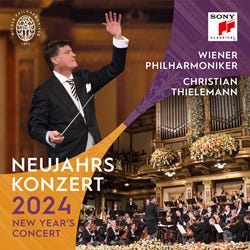The Vienna Philharmonic and Christian Thielemann - New Year’s Concert 2024
(Sony Classical, 2024)
Few annual musical events are anticipated as much as the New Year’s concert presented by the Vienna Philharmonic Orchestra. The history of this orchestra and concert is rich and well-documented. The relationship between the orchestra and its yearly subject, the Strauss family on April 22, 1873, with the premiere performance of "Wiener Blut" (“Vienna Blood”), op. 354 for the Vienna Opera Ball with Johann Strauss, Jr. conducting. From that point on, it was all about Vienna and its orchestra warming to the charms of the Strauss family’s music.
The first New Year's Concert was performed beneath a totalitarian cloud in the early days of World War II. during the darkest chapter of the history of Austria and that of the Vienna Philharmonic. On December 31, 1939, a concert dedicated to compositions by the Strauss family was held with all proceeds going toward the National Socialist fund-raising campaign "Kriegswinterhilfswerk" (“War Winter Relief Effort”).
Beginning on January 1, 1941, a Vienna Philharmonic performance entitled "Johann Strauss Concert" was performed ostensibly in tribute to the Viennese spirit. However, the funds were stolen and used in support of the National Socialists. The conductor at the time was Clemens Krauss, who conducted these concerts until the end of the war at which time the Allies imposed a two-year conducting ban on Krauss, leaving Josef Krips with the honor for 1946 and ‘47. Krauss then returned to conduct seven more New Year's Concerts until Krauss died in 1954.
In Krauss’s absence, Philharmonic concertmaster Willi Boskovsky was given the reins of the New Year's Concerts, conducting the event for the next 25 years. In 1979, with Boskovsky ill and having to abdicate the podium, the Philharmonic chose the renowned conductor, Lorin Maazel, to direct the concerts, which he did until 1986. After 1986 the musicians of the orchestra elected to select a different conductor every year, beginning with Herbert Von Karajan in 1987 and continuing with Claudio Abbado (1988, 1991), Carlos Kleiber (1989, 1992), Zubin Mehta (1990, 1995, 1998, 2007, 2015), Riccardo Muti (1993, 1997, 2000, 2004, 2018, 2021), Lorin Maazel (1994, 1996, 1999, 2005), Nikolaus Harnoncourt (2001, 2003), Seiji Ozawa (2002), Mariss Jansons (2006, 2012, 2016), Georges Prêtre (2008, 2010), Daniel Barenboim (2009, 2014, 2022), Franz Welser-Möst (2011, 2013, 2023), Gustavo Dudamel (2017), Christian Thielemann (2019) and Andris Nelsons (2020).
This change added a tincture of drama to the concerts with the invited conductors broadening the waltz/march repertoire well beyond the Strauss family and its close associates. In 2024, maestro Christian Thielemann (who also conducted in 2019), was tapped to conduct. Thielemann and the VPO have had a close relationship, resulting in the conductor’s first Beethoven Symphony cycle (Sony Classical, 2012) and his recently completed survey of Bruckner’s symphonies (Sony Classical, 2023), marking the bicentennial of the composer’s birth. Thielemann brought no fewer than nine New Year’s Concert premieres, including, appropriately, Bruckner’s Quadrille Op. 121.
Other premieres included:
Karel Komzák’s “Erzherzog Albrecht-Marsch,” op. 136
Johann Strauss’s “Figaro-Polka,” op. 320; “Ischler Walzer,” and “Nachtigall-Polka, Polka schnell,” op. 222.
Joseph Hellmesberger’s “Für die ganze Welt! Walzer” and “Estudiantina-Polka”
Eduard Strauss’s “Die Hochquelle. Polka Mazur,” op. 114
Hans Christian Lumbye’s “Glædeligt Nytaar Galop.”
Thielemann’s conducting personality is conservative, more in keeping with Karajan and Abbado than Harnoncourt of Barenboim. His tempos are traditional, neither too slow nor too fast as was his choice of encores, the expected “An der schönen blauen Donau, Walzer,” Op. 314 by Strauss the Younger and the lively Radetzky-Marsch, Op. 228 by Strauss the Elder. His rapport with the orchestra is palpable, paying off with this fine recording.



